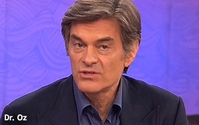
He’s
often called “America’s doctor,” but it turns out he’s about as trustworthy as the wizard of the same name. That's according to a new study of advice dispensed by Dr. Mehmet Oz
-- the photogenic, approachable TV doctor made famous by Oprah, who also has his own magazine.
The study by Canadian doctors, published in the British Medical Journal, analyzed 479 claims
and pieces of advice presented over 40 randomly selected episodes of Dr. Oz’s show. It found that over half of these were either unsupported or flatly contradicted by real medical science.
To be precise, the researchers found support for 46% of Oz’s claims, while evidence contradicted his claims 15% of the time, and simply didn’t exist for 39% of them.
The authors
warned: “Consumers should be skeptical about any recommendations provided on television medical talk shows, as details are limited and only a third to one-half of recommendations are based on
believable or somewhat believable evidence. Decisions around health-care issues are often challenging and require much more than non-specific recommendations based on little or no evidence.”
advertisement
advertisement
In the past, other doctors have taken Dr. Oz to task for claiming, for example, that a diet with endive, red onion and sea bass can reduce the risk of ovarian cancer by 75%. He has also come under
fire for promoting unproven or untested weight loss remedies. In June, he was called before Congress to answer questions about the scientific backing for his medical advice.
Nevertheless, "The
Dr. Oz Show" remains one of the most popular talk shows in the U.S., attracting roughly 2.9 million per day on average. His new magazine, Dr. Oz the Good Life, debuted earlier this year, and
is set to begin publishing 10 times a year in 2015 with a rate base of 450,000. Publisher Hearst Corp. expects that figure to grow.